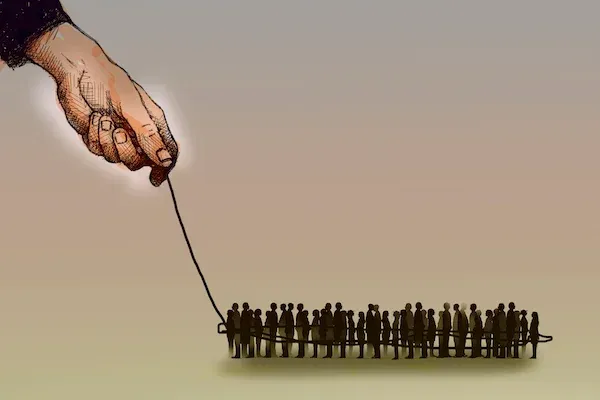
[image source: https://blogs.scientificamerican.com/observations/the-ethics-of-paternalism/]
This week we watched "Poverty, Inc." which talked about the current "solutions" that many organizations have tried in order to help solve poverty in developing countries. It was a very well made documentary that highlights the problems that come with paternalistic charity and unwanted involvement. It really shows that help can be negative, especially when it is given without being asked for or without really acknowledging the problem or the people you are trying to help. I liked the message about cooperating instead of forcing help that you want to give.
For example, in the film they used the shoe company Tom's as an example of why forced charities can create negative setbacks. As Tom's continuously floods countries with shoes, it forces a crutch that is doing more harm than good for their economy. The country and its people is now reliant on Tom's, an American country, to provide shoes instead of being able to provide for themselves. They are now reliant on an outside force where they could have been able to create a growing local industry that would support the local people and generate wealth. Sort of like the phrase 'teach a man how to fish..." if Tom's were to go bankrupt or suddenly stop their program, the people they were helping would be stranded without a leg to stand on.
Foreign Aid can be necessary in some cases, such as natural disasters or pandemics in which it is important to help and provide aid that is needed (and wanted). However, the point of providing aid to better the people that need it, it is not a PR stunt. That can be the issues with some of the "charities" and "donations" is that it is simply to make the donor look good, look like a hero, and not actually improve the lives of those who are on the receiving end. This is why it is more important to listen to the community you are trying to help and following their lead on what they need. If a country needs help rebuilding homes you do that, not force unwanted clothes onto them because that's your brand.
I did appreciate the sentiment behind investing in communities and giving them the opportunity to build themselves up and create a strong foundation for themselves instead of having them dependent on someone(thing) else. The example in the documentary, Shelley Clay’s Artisan Jewelry, was a great show of the kind of foreign aid that could and should be provided to countries in extreme poverty. By creating opportunities and allowing innovation to prosper by the people for the people, the economic growth generated can help pull people out of poverty. By creating business in the country and teaching them how to run the business (aka how to fish), people will be able to do a lot more with that and potentially grow from it as well.
Overall, I really did like this one, I liked the message and I liked the way that it portrayed everything. I agree that interventionalist ideas can create a lot of issues and that it, generally, is not good for the country being intervened with. It is more important to listen to the people who need help and provide support that way than to insist on providing charity that mostly benefits yourself. By listening to the community and helping them help themselves, creating economic growth is more possible and more sustainable in the long term